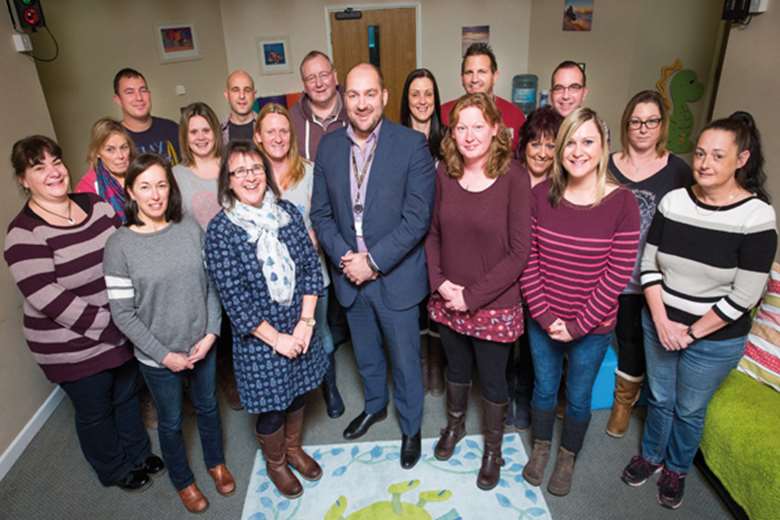Pathways children's home
Adam Offord
Tuesday, June 7, 2016
Pathways is a nine-place children's home in Cornwall that cares for young people aged five to 18 with emotional, behavioural or learning difficulties

- Young people are placed at the heart of decisions and staff focus heavily on relationship building between the young people in care, their families and professionals
- Ofsted rated the council-run home as "outstanding" for the overall level of care in December 2015
ACTION
Pathways is a children's residential care home based in St Austell, Cornwall. The nine-bed home caters for young people aged five to 18 with emotional and/or behavioural difficulties, and those with learning difficulties.
Run by Cornwall County Council, the home has a 23-strong team of staff and was rated "outstanding" by Ofsted in December last year.
Julie Walsh, residential services manager at Pathways, says that the home places children at the heart of every decision, and it is this factor that she believes so impressed Ofsted.
"We focus very heavily on building relationships with the children, families and partner agencies," says Walsh. "We know that good relationships are essential for children, particularly, when we are looking at attachment.
"We have invested heavily in developing knowledge around child development, attachment, and understanding autism."
Walsh says the home develops comprehensive care plans tailored to addressing a child's specific needs, rather than using a "one-size-fits-all" model. Part of this process is to look at how a child's experiences has influenced their behaviour or problems, and finding ways to address these.
Pathways works with children, families and other agencies providing therapeutic support to set realistic and achievable goals for children with one eye to the future.
"A lot of the children here come for a short period of time but others have been here for a number of years and will be here until they are 18 and transfer to adult services," Walsh explains. "Our aspirations are much wider than the period of time we are focusing on, so we can equip those young people going forward."
A key element to the home's strong record on building relationships between staff and young people is the use of evidenced-based practice and research findings to influence and improve services.
Walsh says Pathways prioritises training so that staff have the ability to reflect on existing practice and learn new ways of working.
She says all staff have the statutory and baseline Level 3 diploma for residential child care and senior management are qualified up to Level 5. In addition, continual professional development draws on the Playfulness, Acceptance, Curiosity and Empathy model devised by psychologist Daniel Hughes, and the Intensive Interaction model by practitioner Phoebe Caldwell and freelance trainer David Hewett.
She adds that some of the staff are also about to begin a new diploma in leadership management for residential care as part of their ongoing continual professional development. Child care staff also use attachment theory in their work to develop strong relations with children.
The home also has strong links with partner organisations and holds regular multi-agency meetings on top of statutory reviews. Agencies the home works with include a looked-after children nurse, who helps with external audits of medication practices; different types of occupational therapists who may offer advice on physical health services; and psychologists to support mental health care.
Walsh says: "A multi-agency meeting could be happening once each week because a young person has specific issues, but the standard we aim for is a meeting every six to eight weeks."
Key workers meet with child and adolescent mental health services every six to eight weeks to discuss children's progress and issues that arise. Walsh says each child has at least two key workers who are supported by a member of the management team, allowing for information to be constantly fed through to decision makers.
Cornwall prefers to place children in council-run homes, although does also use residential care provided by the independent sector. Yvette Yates, senior manager for Cornwall's disabled children and therapy service, says this "mixed economy" approach enables the council to have greater influence over the quality of provision, how it adapts to the changing needs of local children and families, and how much it costs to deliver.
Making greater use of its own provision also means that more children can be cared for in homes closer to their family, explains Walsh.
"We recognise children do better when they have contact with families and you can strengthen relationships so we work very hard at keeping children within Cornwall with their families close," she says.
In terms of cost, Pathways has an annual budget of £895,000. Yates says the per-place cost is around half what it would cost to commission a residential placement for children with complex and challenging behaviour from independent sector providers.
IMPACT
Ofsted rated Pathways as "good" overall during a full inspection in June 2013 and September 2014 and "outstanding" overall in December last year, of which an interim inspection in March this year judged the home had "sustained effectiveness".
The December inspection found the overall experiences and progress of young people living at Pathways was outstanding, as was the impact and effectiveness of leaders and managers, while how well children and young people were helped and protected was good.
Among the reasons Ofsted cited for the outstanding rating was the staff team's "dedication and unwavering resolve" to provide the best possible service; their being mindful of the complex needs of young people; stakeholder praise; the work of the senior management team; and the additional support for staff.
This practice example is part of CYP Now's special report on residential care. Click here for more




